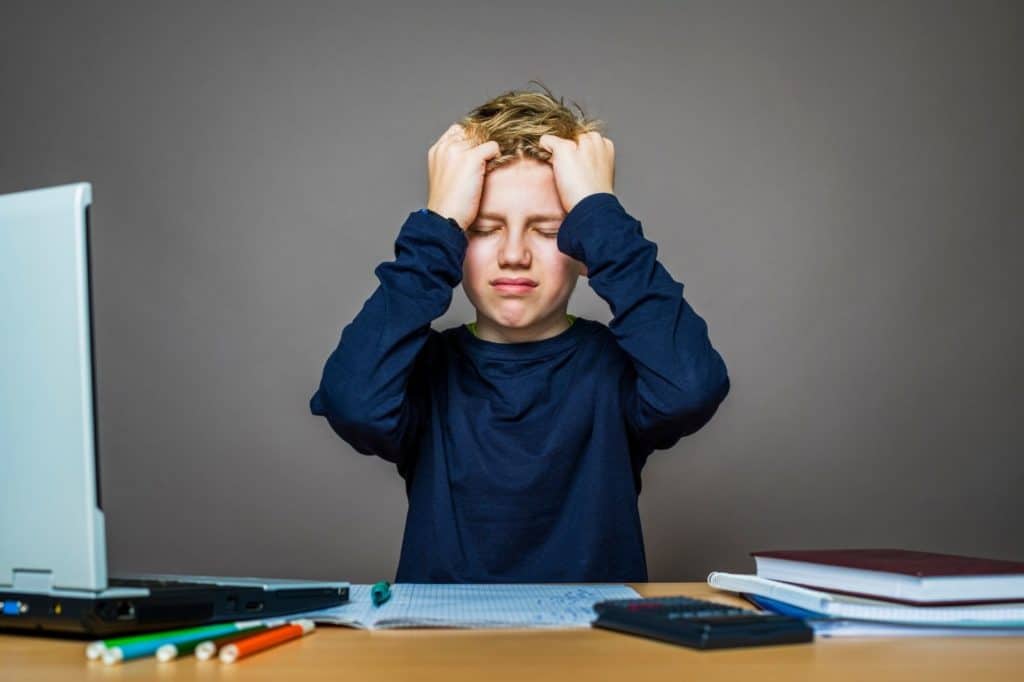I’m betting you have experienced burnout at least once in your adult life. That feeling of exhaustion, the utter lack of motivation, and the burning desire to just quit happens to the best of us – adults and children alike.
For school-age children, their feelings of burnout routinely peak right before the holiday break, about halfway through the school year. Kids are tired, worried about their grades, and studying hard for (and anxiously anticipating) big exams. Add to that the regular stressors of extracurricular activities, then heap on the general anxiety associated with the holidays, and wham! That long break between semesters can’t come at a better time.
In this Forbes article, American Psychological Association’s David Ballard, PsyD, describes job burnout as “an extended period of time where someone experiences exhaustion and a lack of interest in things, resulting in a decline in their job performance.” Frame this in the context of your child and their job, which for the most part is attending and performing well in school, and what your child may be feeling is instantly relatable.
“A lot of burnout really has to do with experiencing chronic stress,” says Dr. Ballard, “In those situations, the demands being placed on you exceed the resources you have available to deal with the stressors.”
Student Burnout Is Common
School-age children can experience stress at increasingly unhealthy levels. When this occurs, students can begin feeling sick more than usual, leading to missed school days that makes them fall behind on coursework, which then causes them more stress. Marcelina Hardy, MSEd, BCC, explains student stress by noting that as a child starts working on a project or classwork, they often work hard because the motivation and energy to succeed is fresh. “However, over time, just as the Energizer Bunny loses its energy, you’ll also start to slow down. The next thing you know, you’re procrastinating on your coursework because you’re unmotivated and mentally, physically and emotionally exhausted.”
Signs and Symptoms of Burnout
The signs and symptoms of burnout can vary among children and adults; however, Dr. Ballard shares seven that are common indicators:
- Exhaustion – emotional, mental or physical; a sense of not having any energy
- Lack of Motivation – a lack of enthusiasm or internal motivation; those days when you have to practically drag yourself to work or school
- Frustration & Cynicism – a feeling of disillusionment or that what you’re doing doesn’t matter
- Cognitive Problems – difficulty concentrating in particular
- Slipping Job Performance – not performing at your best, and perhaps not consistently, either
- Interpersonal Problems – whether at school or at home, relationships are strained with conflict and emotional withdrawal
- Not Taking Care of Yourself – rather that eating and exercising, students may over-indulge in junk food, or self-medicate with caffeine or even alcohol
How to Beat Burnout
It is difficult to watch your child experience burnout. Fortunately, there are strategies that will help you and your child alleviate the symptoms and beat burnout so that the second half of the school year will be a strong one.
- Adjust Expectations – yours and your child’s
- Stop Comparing Yourself – everyone has different strengths and abilities; comparing yourself to another doesn’t make yours any less or any more significant. Teach your child that he is enough and loved as he is.
- Manage Your Time – prioritize the “must haves” and the “nice-to-haves,” and tackle the first things first. Your child must study for final exams; if he has time after doing so to enjoy hanging out with friends, then great! Same goes for parents, too!
- Exercise, Eat Well, and Sleep – when busy and stressed, many of us do not take the time for regular physical activity, healthy meals and a good night’s sleep, yet all three are critical to our overall well-being! Whether your children are younger or teens, they likely need support and supervision in this area…whether they want to admit it or not.
Finally, don’t be afraid to seek help. If you and your child have tried these strategies or others and are still struggling, reach out to a skilled mental health practitioner for support.
For hope and healing,
Mike Hannan
In case of a medical emergency, please call 911. For a child’s mental health emergency (ages 3 to 17), call Clarity Child Guidance Center at 210-582-6412. Our crisis service department accepts walk-ins 24/7. You can find directions to our campus here. Please do not hesitate to reach out to us. We are here to help!










